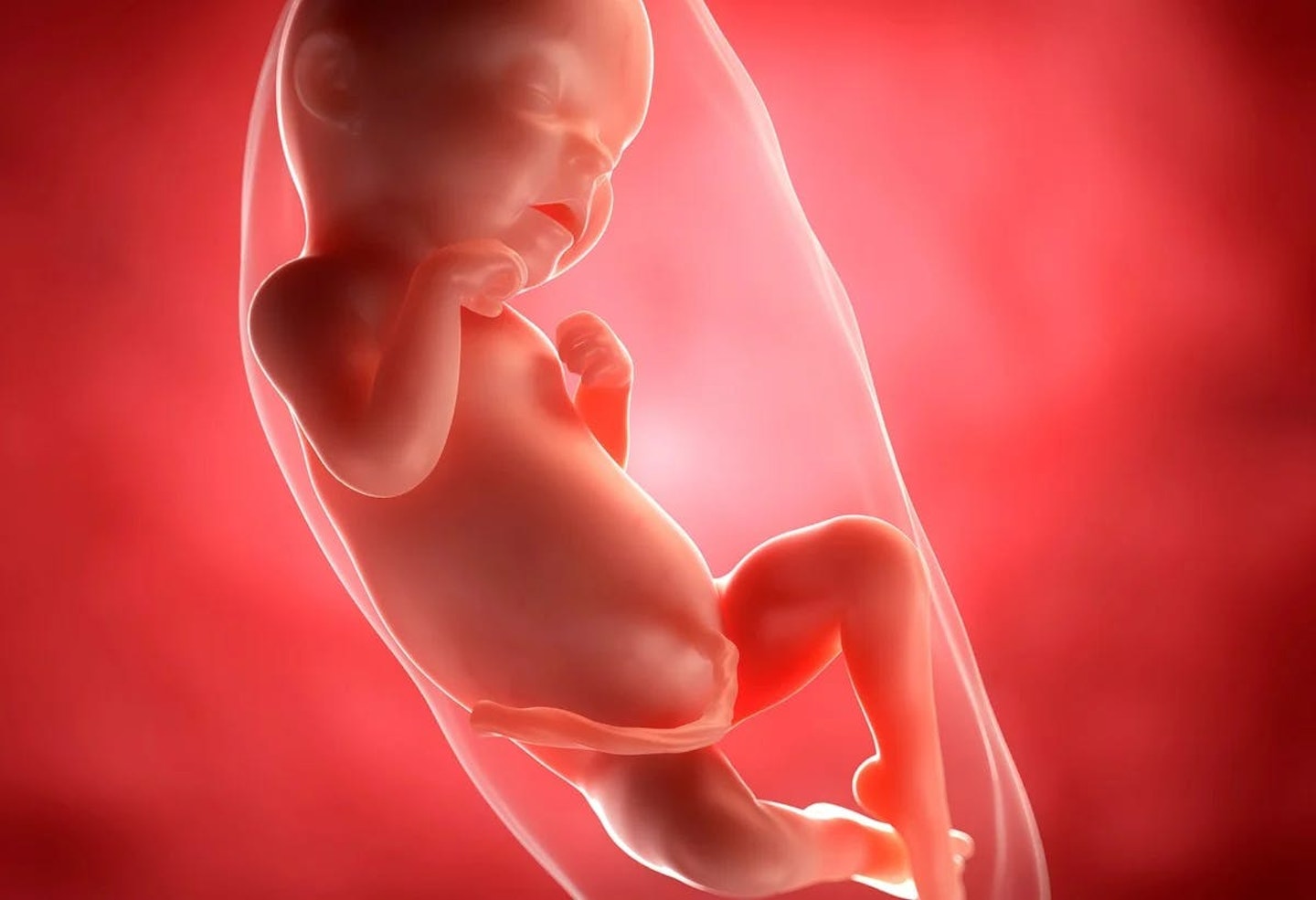Medically reviewed by Emiliana Hall, founder of The Mindful Birth Group®.
At thirty-one weeks pregnant, your bump is visibly moving, and you may be feeling hot under the collar. Here’s everything else you need to know about your baby and your body at thirty-one weeks pregnant.
How big is my baby at 31 weeks?
Your baby now measures over 16 inches long and weighs about three and a third pounds, and is well on their way towards a growth spurt. They are about the size of a coconut and growing steadily.

What’s my baby doing at 31 weeks?
Your foetus is more baby-like than ever: They can turn their head from side to side, and they are moving a lot, to the extent they may be keeping you up at night. They are also extremely lively – wriggling, stretching, and kicking so much now that you might even see your bump move, especially when you’re relaxing in the bath. However, there are more defined patterns of movement and rest, as a result of your baby sleeping for longer stretches of time.
There’s also plenty of fat accumulating under their skin, helping their arms, legs, and body plump up. Your baby’s digestive system, liver, kidneys, and pancreas are functioning.
Your baby’s brain is also working at the speed of light, developing faster than ever, and making tons of connections between individual nerve cells. They can now perceive signals from all their senses, although obviously, they won’t be able to smell anything until they leave the amniotic fluid that has been their home and breathe their first gulp of fresh air.
In the meantime, just as you’re preparing your home for your new arrival, your baby is practising for life in the outside world, making faces, breathing, swallowing, hiccuping, and even sucking their thumb.
Common symptoms to look out for at 31 weeks pregnant
 1 of 6
1 of 61) Headaches
1. It’s those pesky hormones again that might cause you to have headaches, as well as pregnancy fatigue. To get rid of migraines or tension headaches, take 15 minutes to lie in a quiet, dark room, or put an icepack on your forehead or the back of your neck while you relax. Don’t take any medication before checking with your doctor first.
 2 of 6
2 of 62) Frequent urination
2. Your bladder is overcrowded and being pressed on. The best thing to do is to plan bathroom breaks around your activities.
 3 of 6
3 of 63) Shortness of breath
3. Finding it hard to catch your breath? Yup, it’s pregnancy’s fault again. As your uterus pushes on your internal organs, your lungs feel crowded, and it’s harder for them to expand fully, meaning you might experience an unpleasant or uncomfortable feeling of shortness of breath. This may improve towards the end of your pregnancy, when your baby drops lower in preparation for delivery. Sleeping on your side may give your lungs more space to breathe in the meantime.
 4 of 6
4 of 64) Backaches
4. Your growing belly can impact your back, as it will have to curve to accommodate the new weight. Try to attend some prenatal yoga classes to protect your back and relax your mind.
 5 of 6
5 of 65) Leaky Boobs
5. You will notice a yellow liquid coming from your boobs. This is the first part of the baby's food, called colostrum. Your body’s getting it ready for your baby to be born.
 6 of 6
6 of 66) Braxton Hicks Contractions
6. Braxton-Hicks contractions are contractions of the uterus. They tend to be more frequent during the third trimester of pregnancy. They are absolutely normal, and they happen in preparation for the uterus to give birth. To ease these contractions, you must drink plenty of fluids and change position often. These should be quite random, won’t hurt and can last around 30 seconds.
However, if they’re frequent contractions, say more than four in an hour (even if they’re not painful), you notice a change in your discharge (for example, if they're more watery, contain more mucus or are bloody in any way), suffer from cramping, abdominal pain or an increase in pelvic pressure or lower back pain, call your GP or midwife, as these could be signs of premature labour.
What is my body doing at 31 weeks?
Been feeling a lot clammy recently? Well, due to your increased blood flow, your body sweats more as a way of cooling itself down. Nice! Make sure you keep well hydrated with lots of cold water.
If you feel numbness or pins and needles in your fingers, especially your thumb and first two fingers, this is Carpal Tunnel Syndrome. It’s a result of fluid retention in your carpal tunnel, which is a structure in your wrist housing your nerves, tendons and ligaments.
You’re due for another antenatal appointment around now, too, so bring up any issues, worries or questions with your midwife.
What to do this week:
-
Think about the birth plan: Start thinking about pain medication during labour. You don’t have to decide yet, but it’s good to be prepared and understand all the options, whether you know you want pain relief, you’re sure you don’t, or you’re happy to wait and see how you feel on the day. You could sign up for a childbirth education class with your partner, where you can learn all about medical pain relief, such as epidurals, as well as drug-free approaches, such as breathing techniques.
-
Start packing! You should also start thinking about what to pack in your hospital bag. Preparing in advance means all you have to do is leave the bag by the door, and if your baby arrives earlier than expected, you’ll have one less thing to worry about when rushing to the hospital! Luckily for you, we've got a handy downloadable list for you to tick off here.
According to Emiliana Hall, the founder of The Mindful Birth Group®: "At 31 weeks pregnant, you’re firmly in the third trimester, with just a few weeks to go until you meet your baby. This period is marked by rapid growth and development for your baby, as well as significant changes and preparations for you. Here’s what you need to know and what you can expect at 31 weeks pregnant, says Emiliana.
Baby's Development at 31 Weeks
By 31 weeks, your baby weighs about 1.5 kilograms (3.3 pounds) and measures approximately 41 centimetres (16 inches) from head to heel. Key developmental milestones at this stage include:
-
Weight Gain and Fat Storage: Your baby is continuing to gain weight rapidly, storing fat that will help regulate body temperature after birth.
-
Brain and Nervous System: The brain is developing at a fast pace, and the nervous system is maturing. Your baby is getting ready for life outside the womb.
-
Lung Development: The lungs are still developing, but your baby is practising breathing movements, which are essential for lung maturation.
-
Five Senses: All five senses are active, and your baby can respond to light, sound, taste, and touch.
-
Movements: You may notice more pronounced movements as your baby stretches, kicks, and rolls. These movements can be quite vigorous and are a sign of a healthy baby, Emiliana says.
Common Symptoms at 31 Weeks
As your pregnancy progresses, you may experience a range of symptoms. Here are some common ones at 31 weeks:
-
Braxton Hicks Contractions: These "practice" contractions can become more frequent. They are usually irregular and not painful, but they can be uncomfortable.
-
Shortness of Breath: As your uterus expands, it can press against your diaphragm, making breathing more difficult. Try to maintain good posture and practice deep breathing exercises.
-
Heartburn and Indigestion: Hormonal changes and the growing uterus pressing on your stomach can cause heartburn. Eating smaller, more frequent meals and avoiding spicy or fatty foods can help manage this.
-
Swelling: Mild swelling in your feet, ankles, and hands is common. To reduce swelling, elevate your feet when possible, stay hydrated, and avoid standing for long periods.
-
Back Pain: The extra weight and shifting centre of gravity can strain your back. Practising good posture, wearing supportive shoes, and using a pregnancy pillow can help alleviate discomfort.
-
Fatigue: As your body works harder to support your baby, you may feel more tired. Rest whenever you can and prioritise sleep, says Emiliana.
Advice for 31 Weeks Pregnant
-
Prenatal Appointments: Continue attending regular prenatal check-ups. Your healthcare provider will monitor your baby's growth and your health, checking for conditions like gestational diabetes and pre-eclampsia.
-
Kick Counts: Keep track of your baby's movements. Knowing their usual patterns can help you notice any changes that may need medical attention. Aim to feel at least 10 movements within two hours.
-
Nutrition and Hydration: Maintain a balanced diet rich in vitamins, minerals, and protein. Drink plenty of water throughout the day to stay hydrated.
-
Exercise: Engage in safe, moderate exercise like walking, swimming, or prenatal yoga. Exercise can boost your mood, improve sleep, and reduce discomfort.
-
Birth Plan: Finalise your birth plan and preferences and discuss it with your midwife or birthing team. Include preferences for birth place, pain relief, birthing positions, and who you want to be present during labour, says Emiliana.
Emotional Well-being
The third trimester can be an emotional time. Here are some ways to support your mental and emotional health:
-
Stay Connected: Share your thoughts and feelings with your partner, friends, or family. Joining a support group or antenatal class can provide comfort and companionship.
-
Self-care: Prioritise activities that help you relax and recharge. This could be reading, taking a bath, practising mindfulness, or spending time on hobbies.
-
Seek Support: If you’re feeling overwhelmed, anxious, or down, don’t hesitate to reach out for support. Your midwife or GP can provide resources and referrals to counselling if needed, Emiliana adds.
Preparing for Baby
With your due date approaching, it's a good time to prepare for your baby's arrival:
-
Nursery Preparation: Ensure the nursery is set up with essentials like a crib, a changing table, and baby clothes. Make sure everything is ready and organised.
-
Hospital Bag: Start packing your hospital bag with necessary items such as comfortable clothing, toiletries, baby outfits, and important documents.
-
Childcare Classes: Consider attending antenatal classes or workshops. These can provide valuable information on childbirth, breastfeeding, and newborn care.
-
Car Seat: Ensure you have a suitable car seat installed and know how to use it properly, says Emiliana.
What to Discuss with Your Midwife or Doctor
-
Symptoms and Concerns: Bring up any symptoms or concerns you have, no matter how minor they may seem. Your healthcare provider is there to support you and ensure your pregnancy is progressing smoothly.
-
Birth Preferences: Discuss your birth plan and any preferences you have regarding labour and delivery.
-
Postnatal Care: Ask about what to expect after birth, including infant feeding support, postpartum recovery, and newborn care.", says Emiliana.
Meet the expert:

Emiliana Hall is the founder of The Mindful Birth Group®, which provides award-winning Mindful Natal® courses and the PregnaHub® app, as well as an accredited Teacher Training program and Midwife CPD courses.
She is also an experienced Birth and Postnatal Doula. Emiliana's vision is to make vital antenatal and postnatal education and ongoing support accessible to everyone in the UK.
Deborah Cicurel is a writer for Mother and Baby who has specialised in content about pregnancy.
